The other half of the embryo

We live in a nation divided over whose rights matter more. Women’s rights. Baby’s rights. But there is another half of the embryo that needs representation. Men are equally responsible for the abortion debate going on in this nation.
A man contributes to half of the embryo. But when held accountable, many men will leave. It is not uncommon for many women to carry the weight of their pregnancy decisions and the emotional aftermath on their own.
If a man accepted the responsibility of fatherhood, would a woman be more empowered to continue with her pregnancy? And ultimately, is a perfect relationship enough to prevent the need for abortion?
In our Tinder-ed culture, physical intimacy is often pursued without commitment. A woman hopes that he will stay when she becomes pregnant. Instead, he pressures her to have an abortion and then leaves. Afterward, she grieves for the standards she thought she would never compromise. She finds another relationship with the same empty promises. And so the cycle continues.
A woman may think abortion is justified because she believes it is for the child’s good. She may not see herself as a mother. She cannot care for a child in the way she has envisioned. This is not the story that she has written for herself. Abortion is the quickest way to move on and erase long-lasting ties. Afterward, there is initial relief. But then for many, a deep hurt follows. Motherhood with the wrong man, wrong context, and wrong timing is not for her. But it does not mean she will hurt any less afterward.
The root cause of abortion is multifactorial. There are tangled family webs of absent fathers. Mothers entrapped in cyclic financial poverty with multiple children. Generational imprisonment in mental health struggles and addictions.
But the most common reason for abortion in our culture is that motherhood has shifted to"burdenhood". The burden is too heavy and the hills are too steep. Men also face tall barriers to fatherhood. His plan does not involve the financial strain of a family. The responsibility of fatherhood is too much to bear for one night of sexual freedom.
There is one universal truth to every man and woman who has chosen abortion: humans believe they have authority over life. Regardless of the circumstances in which a child is conceived, the true debate has always been who has authority over life – the Creator or the created. Whoever holds the authority decides whether a baby shall remain a tiny human in a cluster of cells or become a developed person. Whoever holds the authority accepts the responsibility and the consequences.
Most of our society lives as if there are no consequences to sexual freedom. But the reality is unwanted pregnancies and the need for abortion highlight the depths of sexual brokenness.
God answers sexual brokenness through the womb of a pregnant virgin. The Bible reveals that the other half of the embryo in Mary’s womb was divine. The immaculate conception of Jesus was a physiologic miracle that only a Creator could fashion. This divine embryo would bring fairness to all of the unfair circumstances surrounding the womb and life. No longer would a woman face unwanted pregnancy by herself. Jesus would understand abandonment on the cross. He would have the power to leave the cross, but he would choose to stay instead.
The problem of abortion is not in who contributes to the embryo but in our individual relationships with God. Even a good human partnership is still not enough to prevent abortion. It is the relationship with one’s creator that changes a man and woman’s ability to face the overwhelming task of parenthood.
The Christian believes that when a woman has a relationship with her Creator, she is not alone. Jesus knows her needs and cares for her. When a man has a relationship with his Creator, he accepts responsibility for his actions. Like Jesus, He has a choice. He can abandon his partner or choose to stay.
When men and women trust their Creator as their authority, there is paradoxical freedom. For God’s authority is rooted in love, tenderness, and protection. A rich relationship between Creator and creation awaits.
Perhaps an unwanted pregnancy is not confinement, but a call to communion with the Creator. An unwanted pregnancy may be a divine opportunity to walk with God. The walk will be difficult with a stroller, and it will also be difficult without a stroller. But during this walk, He holds our tiny hands in His. So that no matter how steep the hill or how high the barriers – we are never truly alone.
Dr. Rachelle Keng is an obstetrician-gynecologist




























